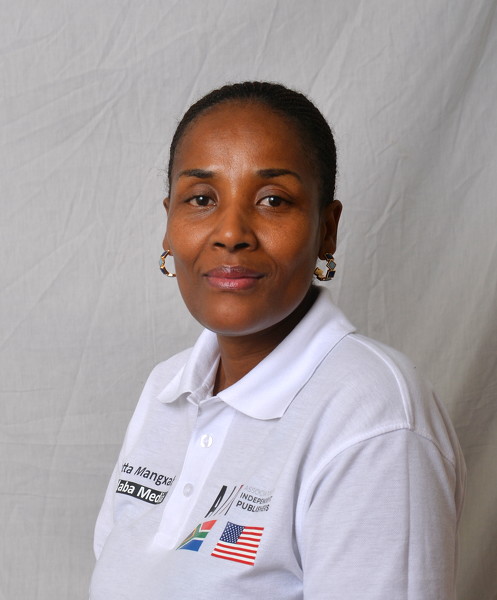
South African journalist Anetta Mangxaba spent a week with The Daily Standard.
CELINA - Anetta Mangxaba, a South African woman, shadowed The Daily Standard staff last week to learn more about the news industry and apply the knowledge to her own media operation on the other side of the Atlantic.
Mangxaba, 46, is the operations director and publisher of Dizindaba Media, or News Reveal, an isiXhosa-language newspaper serving isiXhosa-speaking people in Eastern Cape and Western Cape, South Africa.
Dizindaba Media is an online and print publication that addresses community issues. Mangxaba and her husband operate the publication. She lays out the paper and handles payroll and administration while her husband edits content submitted by three freelancing reporters.
"We have been (invited) by the American Embassy to come and study sustainability through Ohio University," Mangxaba said. "That's why we're here. The process, which was intense, was open to the whole country. They had over 60 applications and only ten were chosen."
She said the program is designed for South African media representatives "to see and compare how local media is doing it here and what business models we can get from here that we can duplicate in our country."
With the support of a grant from the U.S. Department of State and the U.S. Embassy in South Africa, the Association of Independent Publishers (AIP) developed a project to strengthen South Africa's local media sector. As part of that project, the AIP has partnered with the E.W. Scripps School of Journalism at Ohio University in Athens.
The Daily Standard sat down with Mangxaba to discuss South African media, issues confronting the Cape and her takeaways from her week in Celina.
"At my country, you (The Daily Standard) are at the mainstream level because you would never find a small publication like mine with what you have here," Mangxaba said.
Mangxaba said she was paired with The Daily Standard because it maintains an independent press. Her outlet in South Africa has no other option but to print at a competitor's press.
"We have no control of the pricing and time slots," she said. "In my case, my publication is supposed to come out on a Thursday, but because my press gives me a deadline of Tuesday, I am always a day before my actual publication date. That makes me lose out on a day's business because if a client comes on a Wednesday morning wanting to advertise, my paper's already printed. It's very frustrating."
To compete with the other newspapers, 60% percent of Dizindaba's content is from the Eastern Cape even though the newspaper is in the Western Cape. By focusing primarily on Eastern Cape content, Dizindaba draws in residents that otherwise would not read the paper.
"We had to look at the unique selling point because we are competing with this big giant," Mangxaba said.
Dizindaba is in constant competition with media behemoths. Its competitors don't charge the public for the newspaper as they sustain themselves through advertising.
That means Dizindaba can't charge its readers, either.
Additionally, the competitor that prints its newspapers applies an upcharge on printing fees.
Although there are several newspapers besides Mangxaba, institutional roadblocks such as energy cuts have forced many publishers to shut down, leaving large local news deserts in their wake.
"We have load-shedding in South Africa, which means we have power cuts," Dizindaba said. "We have been on this power cut since last year. Remember, coming from COVID … many of my colleagues in the industry have closed. When businesses close, advertising ceases."
Ongoing electricity blackouts across the country are due to insufficient generation capacity and lack of funding. Mangxaba said some people have gone hungry and lost their homes, and medical treatment is limited.
To combat the news deserts, the government created an agency to facilitate diverse media.
However, Mangxaba said the agency primarily supports online publications and radio.
"I normally say they give birth to the babies, and they kill them themselves," she said.
Mangxaba said she is exhausted and angry.
"We don't know how to fight and win this battle," she said. "We have engaged the government and the competition commission. We have exhausted all avenues that we thought these people are supposed to be able to help us."
"Print is not going to die anytime soon unless you kill it yourself," she continued. "We still have rural areas where there still is no electricity, so how must those people know what's happening? Some of them don't even have a smartphone. It's a constant fight. We have fought, we have had ministers promising but up until today, nothing."
Despite the challenges, Mangxaba said she wouldn't change her job for the world. She said her community depends on her to deliver the news.
"You cannot monetize what we do because (there's) too much that goes into this, emotionally, physically, mentally and spiritually," she said of her newspaper.
"For the past 13 years, I have become a social worker, a psychologist, a fire station and police. If there's an issue in the community, I'm the first to know. If there's a fire in the community, I'm the first to know. If there's a gender-based violence issue, I'm the first to know."
She said this trip to the United States reminded her of that. She has learned design shortcuts, writing tips and tricks, how the press works and what more she can do with advertising.
"Me being on this trip is also a privilege and it's such a big honor," Mangxaba said. "There were over 60 publications in the country that applied … and I'm one of those. I don't take it for granted."
